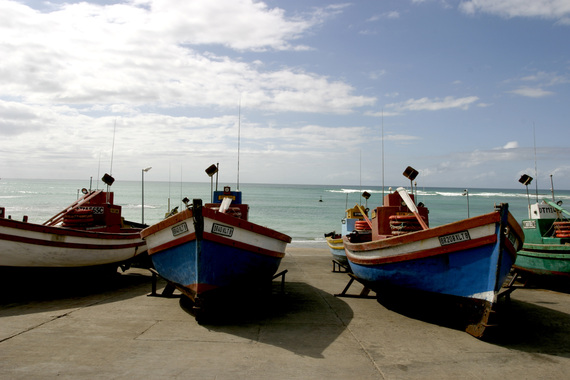 Fishing Boats by South African Tourism via Flickr
Fishing Boats by South African Tourism via Flickr
The European Union, United States and 28 other countries have ratified and brought into force the first global treaty that aims to put an end to illegal fishing and enforce a previous United Nations agreement. The Port State Measures Agreement (or PSMA) is a laudable achievement that comes after seven grueling years of negotiations among nations as geographically far flung as Iceland, Oman and Uruguay, but the treaty holds special promise for African nations in their long struggle to protect their territorial waters from illegal fishing boats - often Chinese vessels, notorious for their disdain for human rights and environmental standards.
Officials were quick to hail the PSMA as the product of an ambitious and determined effort to reign in a problem that has plagued local economies and state treasuries for decades - but the devil is in the details. For all its bluster, the treaty holds no guarantees that any provisions designed to improve port controls and vessel licenses will be enforced with the same consistency or expertise in different parts of the world. It's no wonder that environmental activists and watchdog groups were guardedly optimistic, mixing their praise with concern that the agreement isn't nearly enough to curb the $23.5 billion a year industry or address the scope of the damage done to the world's coastal waters.
There is plenty of evidence for their skepticism. The treaty requires participating countries to prevent access to ports until they've verified detailed information in advance about every vessel seeking entry, conducting standard inspections when vessels enter and denying access when necessary. Fishing boats are permitted to dock only at special ports equipped for enforcement and inspection. When officials complete a failed inspection, they're required to both deny access and report violations, sharing that information with the vessel's home country as well as with neighboring countries and their ports.
That raises real questions about countries like Thailand, which have signed the PSMA but have abysmal enforcement records. Thailand is now the world's third-largest exporter of seafood, but the industry relies on illegal overfishing that leads to environmental damage as well as even appalling human rights violations. High-profile investigations of Thailand's fishing operations, spearheaded by the AP and the Guardian, have raised awareness of human trafficking, safety violations and other concerns that have led the international community to demand reforms. The EU, for its part, is set to meet with Thai officials next month to assess progress - or, in its absence, enact a ban on Thai seafood.
Illegal fishing and the cost to Africa
Thailand, however, is just the tip of the iceberg of a practice whose practice has inflicted the most harm on Africa's fragile coastlines - oftentimes at the hand of Chinese vessels. Although China is not a party to the treaty, the impact of Chinese fishing operations on the African continent is a key motivation for African nations like Somalia - notorious for its struggles with piracy in waters off the Horn of Africa - to join Kenya, Mozambique, Angola, South Africa, and several others in signing the treaty. The stakes are high for all of the nations involved, notably in coastal nations like Mozambique and Seychelles as they seek to protect their rich waters from illegal fishing. In 2013, only one of the 130 ships fishing off Mozambique's shores was actually from that country, prompting the government to order 30 ships to take advantage of its own ocean resources. The order included 24 fishing ships as well as six patrol boats to protect the fleet and fend off illegal fishing activities. When Mozambique ratified the PSMA in 2014, the World Wildlife Fund estimated that illegal fishing cost it $35 million a year - a huge sum for a poor nation.
A Greenpeace report on China's distant water fishing (DWF) practices, released in 2015, found that China's fleet of fishing vessels operating in West Africa's coastal waters skyrocketed from 13 to 462 vessels in just 30 years. These boats, flying Chinese flags or registered to Chinese owners, now account for 20 percent of the nation's DWF fleet. Concerns about Chinese operations extend beyond illegal and unregulated fishing or tonnage fraud, and that's because most of these ships are bottom trawlers - a high-impact method that inflicts some of the worst environmental damage. Bottom trawling entails dragging a weighted net across the seabed, catching both common fish and endangered species while tearing up ocean habitats. The Greenpeace report also emphasizes a subtler cost of the practice: Chinese fishermen aren't just engaging in illegal fishing that impacts the fragile ecosystems off Africa's coasts. They are also imperiling the local fishing industries many African coastal communities rely on for their livelihoods.
West Africa loses $1.3 billion a year to illegal fishing. But as African nations seek to align their policies with sustainability targets, the commitment made by nations like Guinea and Gabon is encouraging. They reflect a proactive optimism that extends beyond the immediate threat of China to preventing the far greater financial impacts associated with climate change, including the increasing acidity of ocean waters and other long-term threats to biodiversity and food security.
Critics rightly point out that in order for the UN treaty and similar regional or NGO initiatives to properly function, more countries need to ratify and implement them to create a real impact. While some unilateral efforts have met with success - an agreement between South Africa and Mozambique among them - that real impact will require a coordinated global effort.
The private sector should be on board as well, especially the insurance industry, which many experts believe is a low-cost option to stop illegal fishing by denying coverage to operators who currently have no difficulty obtaining it. A collaborative international effort that aligns public and private interests is more likely to succeed in protecting both local economies and the environment.
